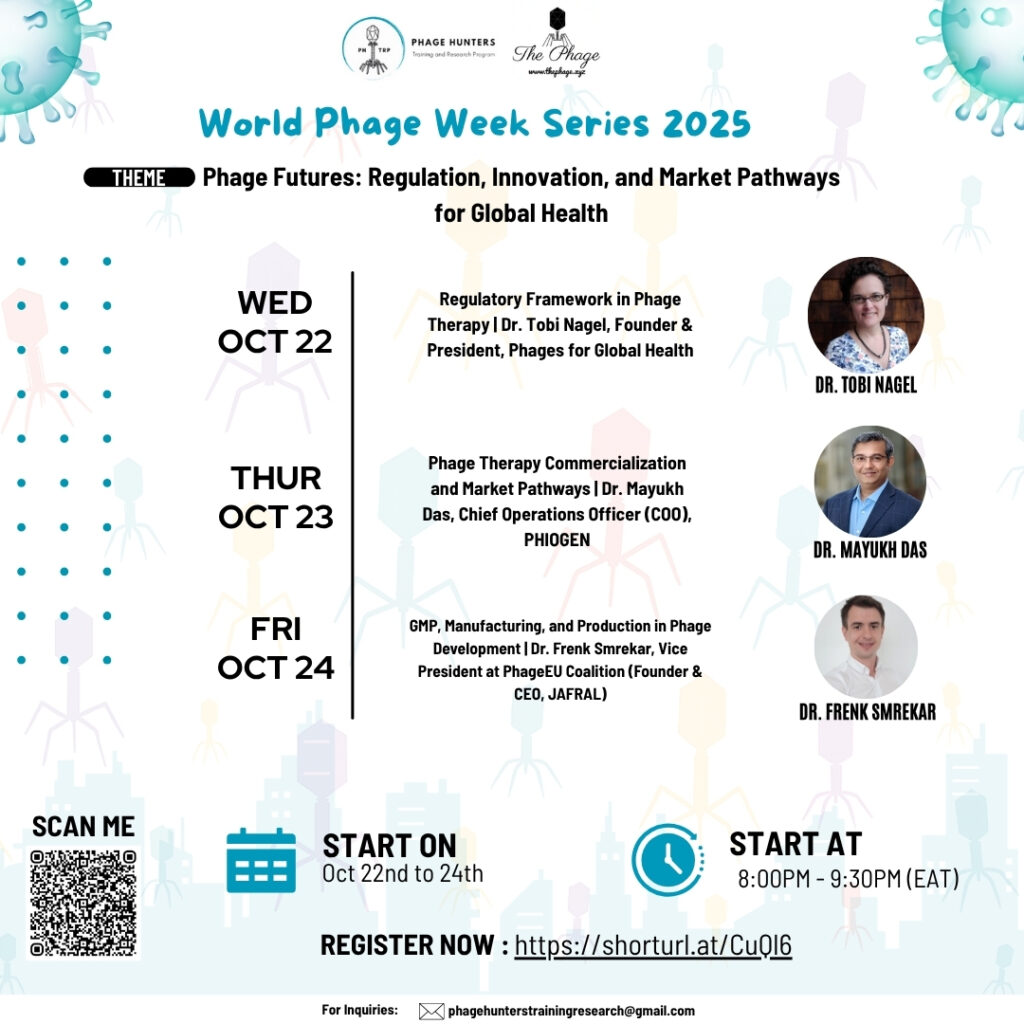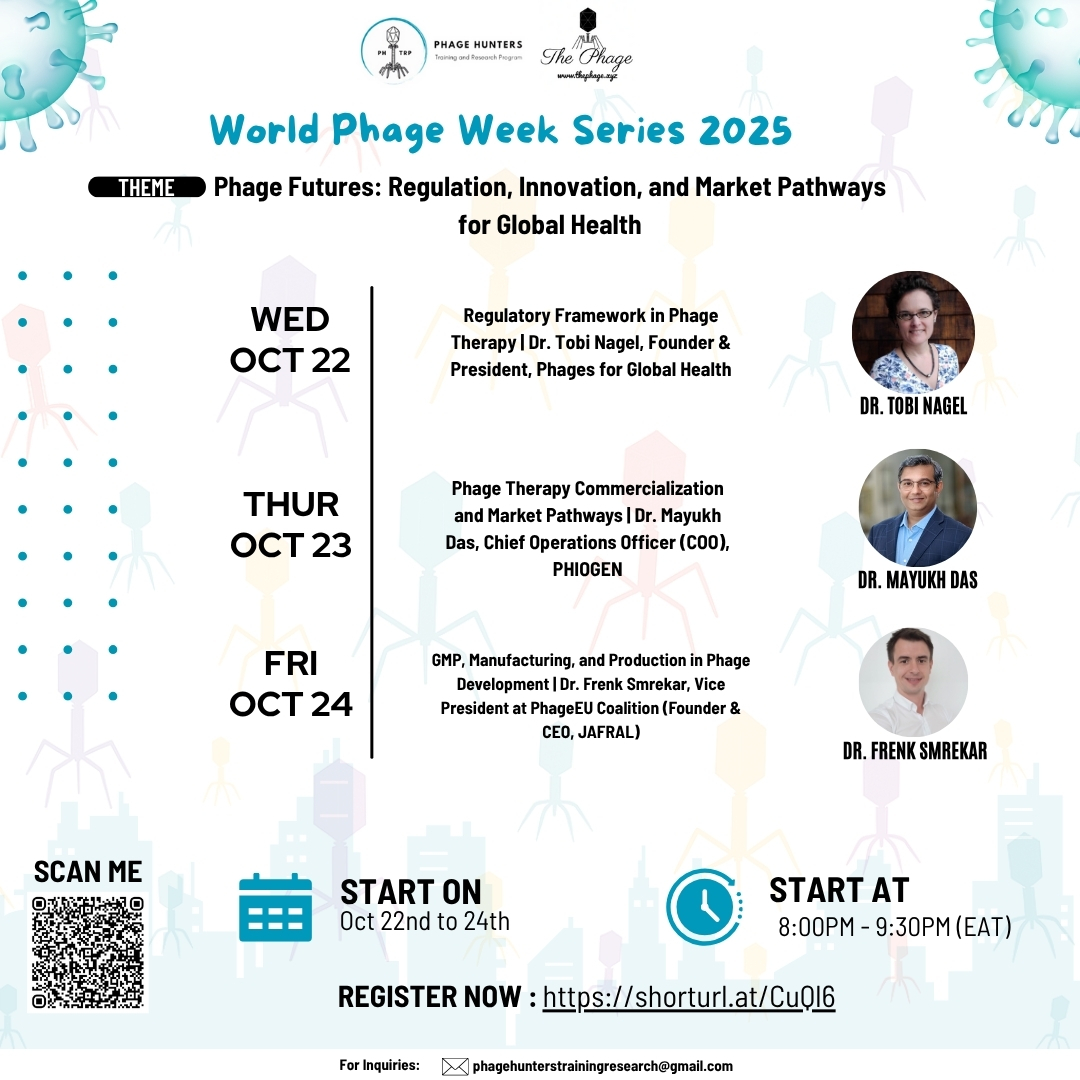
The World Phage Week (October 22-28) 2025 is here, celebrating the birthday of Frederick Twort, a pioneer in phage research. This year, to mark this event, The Phage & Phage Hunters Training and Research Program (PHTRP) has brought together a special webinar series starting 22, 23 & 24 October 2025 — 20:00 EAT (East Africa Time, UTC+3), exploring the latest research in phage science, from regulatory reforms and commercialization to production scale-up.
About Dr. Tobi Nagel
The day one speaker was Dr. Tobi Nagel, Founder and President of Phages for Global Health, a non-profit organization that facilitates the application of phages as antibiotic alternatives in Africa and Asia. Innovation in phage science is advancing faster than regulations. The session focused on how we can ensure life-saving phage therapies reach patients safely, quickly, and equitably, particularly in low- and middle-income countries (LMICs). Dr. Tobi Nagel is conducting a Fulbright Global Scholar Project on phage regulation in high-income countries, sharing insights with LMIC regulators.
Regulatory Frameworks
As we dive deeper into regulatory frameworks across the continents, Dr.Tobi says, “Clinical trials do not require formal phage guidelines, and over 35 trials in 16 countries began without formal phage-specific regulations, typically integrating phages into existing frameworks.”
Antimicrobial resistance (AMR) is projected to cause 10 million deaths annually by 2050, with 90% occurring in Africa and Asia alone. Different strategic phage regulatory pathways are being implemented across the globe, for example, in Belgium and Portugal, and part of the European Pharmacopoeia, it is officially approved as Magistral/Compounded Phages Approach.
Regulatory Framework for Human Use
Dr.Tobi informed us that the U.S. FDA and EMA (European Medicines Agency) implement Six Key Phage Characterization Data Points, which are :
- Strictly Lytic: Demonstrated by genomic evaluation, the phages should be in lytic phase only.
- Genomic Evaluation: Lack of toxins, AMR genes, virulence genes in both phage and bacteria, and lack of prophages in the bacteria used for production.
- Activity/Potency: Efficacy against the target strain or pathogen type.
- Purity: No impurities from bacteria or chemicals, certified by an organization (e.g., sterility, endotoxin levels).
- Stability: Demonstrated for the intended storage duration and temperature, including for phage combinations.
- Transduction Data: Assessment of generalized transduction (gene transfer capability),
- The U.S. FDA requires GMP manufacturing for clinical trials, but has a “sliding scale” for Phase 1, allowing flexibility for early stages if the six data points are met.
Dr.Tobi also discussed a few important points on U.S. FDA Clinical Trial Protocol Requirements, which are:
- Pre-specification of phage delivery, pathogen, and infection site, with flexibility for modifications.
- Appropriate inclusion/exclusion criteria for patients.
- Documented qualification of investigators and their ability to manage the study.
- Predefined adverse events and monitoring protocols.
- IRB (Institutional Review Board) approval, informed consent, and patient information confidentiality.
- Consideration for conducting Phase 1 safety studies in infected patients rather than healthy ones, given phages’ specific action.
Regarding the European Medicines Agency (EMA), Dr.Tobi states that “the goal is to harmonize, not replace”, national regulatory bodies. Recently launched in 2019, the African Medicines Agency (AMA) also follows a similar model to the EMA, insisting that “the regulation should be adaptable due to the dynamic nature of phage-host interactions.”
Magistral Phage System
Speaking of Magistral Phage System, which began in Belgium in 2018, Dr.Tobi says that, “the monograph system was already in place in Belgium. There were different monographs that were written for different types of medical drug applications. And if you’ve got an approved monograph in Belgium, then you can have drugs produced according to that monograph. This monograph outlines how phages should be produced to be given on a personalized level to a single patient. Under this monograph, a pharmacist in Belgium can provide natural phages, not engineered phages, as the drug, as the active pharmaceutical ingredient, as long as three conditions are met that are
- 1) There is a prescription from a physician for that phage
- 2) that the patient is pre-named so this is not just for anyone but the physician says this patient needs this phage
- 3) and then the final product must be approved through an independent government-approved lab
And the approved lab looks into the five or six data points that, FDA and the EMA look for, confirming the purity, potency, and stability of the phage. However, this does not need to be GMP-produced phages because this phage is manufactured for a single patient alone, and it just wouldn’t make sense to do a large GMP manufacturing batch for one patient.” And they also do not require transduction data, as it is hard to accurately measure for the condition in which it will be used.
Phages that have been produced through the Belgian magistral system have been exported to at least 12 countries, with in-country approval by the local regulators. This magistral or monograph system was incorporated into the European Pharmacopoeia in May of 2024.
As we move on to discuss the regulations in low- and middle-income countries (LMICs), Dr.Tobi informs us that “the WHO benchmarks regulatory systems into four maturity levels (ML1 to ML4)”. High-income countries are at ML4, while LMICs are at ML1 or ML2, and a few African countries have reached ML3. Further, Dr. Tobi enlightened the audience on the path forward in African countries, which is mainly due to the lack of regulatory systems in place. In such a scenario, she suggests, “patients could be treated with phages produced overseas, approving phages already approved by overseas regulators”.
Regulatory Framework in Different Industries
The phage application embodies its use in poultry, aquaculture, and the farming industry. “These non-human applications of phage products often receive a ‘stamp of approval’ for safety, but not necessarily efficacy”, says Dr.Tobi, emphasizing that “countries need to engage with their regulators to understand which agency oversees food and non-human applications”. Emphasizing robust purification and formulation in phage manufacturing, both upstream and downstream, Dr. Tobi informed us that genetically modified phages are now going through clinical trials.
With the current burden of AMR, understanding phage purification techniques, working on the safety and efficacy of the phages produced becomes imperative.

